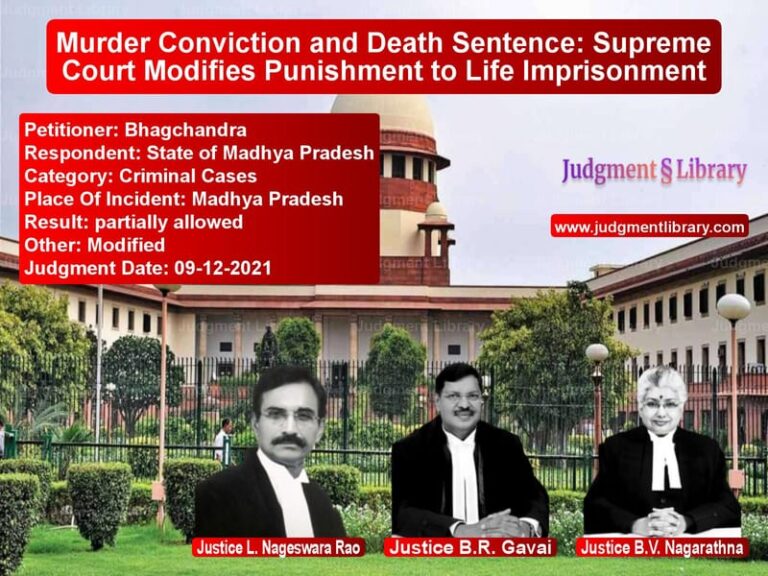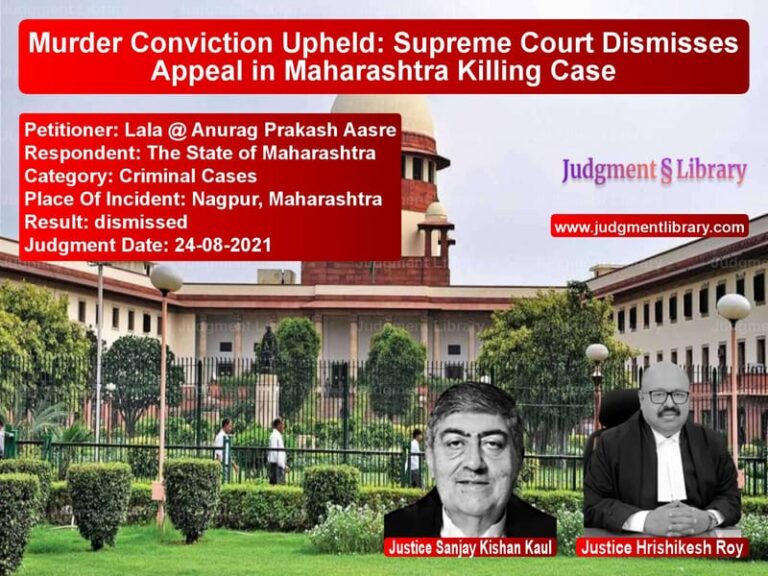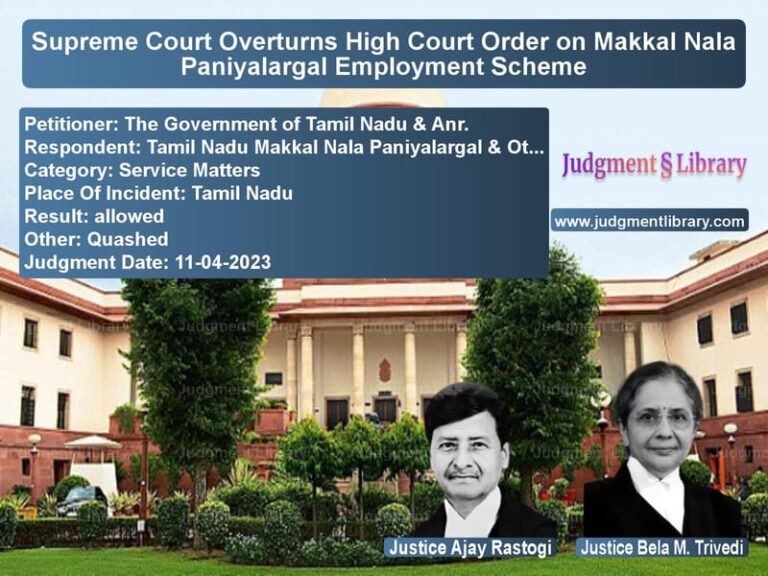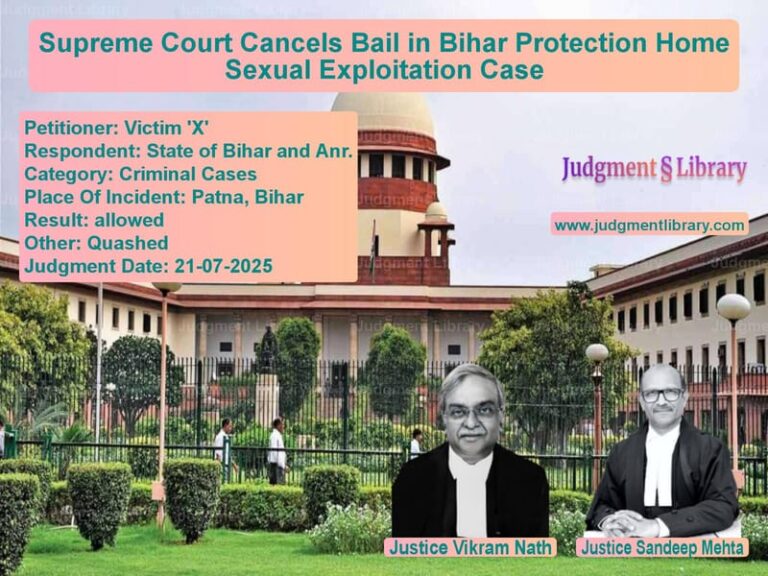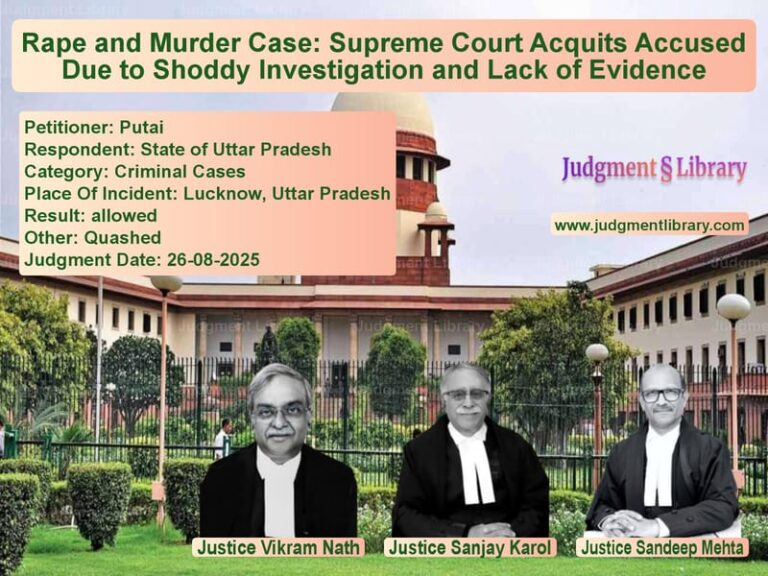Default Bail and Judicial Interpretation: Enforcement Directorate vs. Kapil Wadhawan
The case of Enforcement Directorate vs. Kapil Wadhawan & Another is a critical judgment concerning the interpretation of default bail under Section 167(2) of the Code of Criminal Procedure (CrPC). The issue at the center of the case was whether the day of remand should be included or excluded while calculating the permissible period for filing a charge sheet before an accused can claim default bail. The Supreme Court examined conflicting precedents and referred the matter to a larger bench to resolve the legal ambiguity.
Background of the Case
The Enforcement Directorate (ED) arrested Kapil Wadhawan and his co-accused on May 14, 2020, under Section 3 of the Prevention of Money Laundering Act, 2002 (PMLA). They were remanded the same day. Under Section 167(2) of CrPC, an accused is entitled to bail if the investigation is not completed and a charge sheet is not filed within 60 days for certain offenses.
The ED filed the charge sheet electronically on July 11, 2020, and submitted a physical copy on July 13, 2020. However, the respondents moved for default bail on July 13, 2020, arguing that the 60-day period had expired on July 12, 2020. The Special Judge rejected the bail application, ruling that the period should be counted from May 15, 2020, effectively making July 13, 2020, the last day for filing the charge sheet.
However, the Bombay High Court overturned this decision, ruling that the remand day should be included in the calculation, making July 12, 2020, the last day. Since July 12 was a Sunday, the charge sheet filed on July 13 was on the 61st day, entitling the respondents to default bail.
Key Legal Issues
- Whether the day of remand should be included in calculating the period for default bail.
- Whether the ED’s charge sheet filing on July 13, 2020, was within the legally permissible timeframe.
- Interpretation of Section 167(2) of CrPC regarding the time frame for filing a charge sheet.
Arguments by the Enforcement Directorate
- The ED contended that the 60-day period should be calculated excluding the first day of remand.
- They relied on judicial precedents such as State of M.P. vs. Rustom & Ors. and M. Ravindran vs. Intelligence Officer, Directorate of Revenue Intelligence, which supported excluding the day of remand.
- The ED argued that since July 12, 2020, was a Sunday, the charge sheet filing on the next working day, i.e., July 13, 2020, was legally valid.
- The prosecution emphasized that the legislative intent of Section 167(2) of CrPC is to allow investigation within the prescribed period while preventing undue delays.
Arguments by the Respondents
- The respondents contended that the day of remand should be included in the calculation, making July 12, 2020, the last day.
- They relied on precedents such as Chaganti Satyanarayan vs. State of Andhra Pradesh and CBI vs. Anupam J Kulkarni, which supported their argument.
- The defense pointed out that since the 60-day period expired on July 12, 2020, and no charge sheet was filed by that date, the accused were entitled to default bail.
- The respondents argued that the prosecution had failed to meet the statutory requirement, and any delay beyond the permissible period should result in automatic bail.
Supreme Court’s Analysis
The Supreme Court acknowledged the conflicting interpretations of default bail provisions and observed:
- “Some judgments have favored the exclusion of the date of remand, while few other cases have taken a contrary view.”
- “The ratio in Chaganti Satyanarayan and Mohd. Ashraft Bhat was not considered in the three-judge bench decision in M. Ravindran.”
- “Since the latest decision contradicts earlier rulings, a larger bench must settle the law.”
The Court noted that a uniform interpretation was necessary to prevent conflicting decisions across various courts.
Final Judgment
The Supreme Court referred the matter to a larger bench to resolve the legal conflict regarding default bail calculations. It directed the registry to place the case before the Chief Justice for appropriate orders. Additionally, the Court scheduled an urgent hearing on the interim bail request of the respondents.
Read also: https://judgmentlibrary.com/murder-acquittal-upheld-supreme-court-rejects-odisha-governments-appeal/
Implications of the Judgment
- This ruling underscores the importance of clarity in calculating remand periods for default bail applications.
- The decision highlights the need for a uniform interpretation to avoid discrepancies in judicial pronouncements.
- It ensures that procedural lapses do not unfairly deprive an accused of their right to bail.
- The judgment sets a precedent for future cases where default bail is contested based on remand period calculations.
Conclusion
This judgment highlights the complexities in interpreting default bail provisions under Section 167(2) of CrPC. The Supreme Court’s decision to refer the matter to a larger bench underscores the importance of uniform application of the law regarding remand period calculations. The case also serves as a reminder of the significance of procedural safeguards in criminal law, ensuring that neither the prosecution nor the accused are unfairly prejudiced due to ambiguous legal provisions.
Petitioner Name: Enforcement Directorate, Government of India.Respondent Name: Kapil Wadhawan & Another.Judgment By: Justice Sanjay Kishan Kaul, Justice Hrishikesh Roy.Place Of Incident: Mumbai, Maharashtra.Judgment Date: 23-02-2021.
Don’t miss out on the full details! Download the complete judgment in PDF format below and gain valuable insights instantly!
Download Judgment: enforcement-director-vs-kapil-wadhawan-&-ano-supreme-court-of-india-judgment-dated-23-02-2021.pdf
Directly Download Judgment: Directly download this Judgment
See all petitions in Bail and Anticipatory Bail
See all petitions in Money Laundering Cases
See all petitions in Legal Malpractice
See all petitions in Contempt Of Court cases
See all petitions in Judgment by Sanjay Kishan Kaul
See all petitions in Judgment by Hrishikesh Roy
See all petitions in Remanded
See all petitions in Remanded
See all petitions in supreme court of India judgments February 2021
See all petitions in 2021 judgments
See all posts in Criminal Cases Category
See all allowed petitions in Criminal Cases Category
See all Dismissed petitions in Criminal Cases Category
See all partially allowed petitions in Criminal Cases Category


